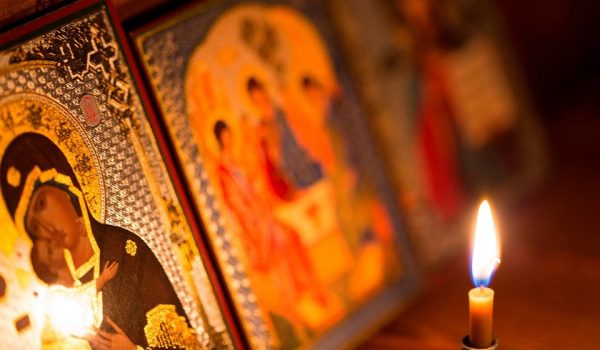As we come to the end of 2020, we are still struggling with a pandemic, and we can see clearly that it will be a while before life gets back to “normal”. In some ways, we may have found blessings in this strange new situation, as extracurriculars are cancelled and many of us are spending more time at home with our families. Some have found that this pandemic allowed them — forced them, really — to slow down, and ultimately that may be a blessing. But there are so many ways in which the pandemic is worryingly difficult. In how many homes is abuse increasing? Is mental health on the decline? This is a difficult situation, and like so many things, it both offers opportunities and creates real problems.
Our spiritual lives may be suffering. Perhaps we used to tell ourselves that if only we had more hours in the day, if only life would slow down a bit, we could really dedicate ourselves to prayer… and now, given that golden opportunity, have we prayed more? This pandemic has given us the gift of more time, of quieter schedules, and even in some cases, of a sort of monastic retreat in our own homes. Are we finding that we’ve grown closer to God, or is this more solitary experience strangling the faith that we’ve been trying to establish in our homes? Surely all of our answers are as unique as we are, but we should all take this moment, more than halfway through the Nativity Fast, to take inventory. How are we doing?
Many of us can no longer attend liturgy on Sunday mornings, but instead rely on YouTube, worshipping through livestreams. Many of our children are sitting at a screen on weekdays for school, and then again on Sundays for church. So many are cut off from their communities, and I wonder what the long-term effects of this isolation will be.

I recently received a thought-provoking note from Jennifer, an insightful mom who has been using our Tending the Garden of Our Hearts resources with her kids. She said,
“[…] I believe very much that a generation of kids will need spiritual rehabilitation after the events of 2020. I’ve read a little research on the effects of trauma and how far reaching even small traumas can be. We also all know how bad it is intellectually and spiritually, for kids to sit in front of screens for hours on end. Countless kids are doing just that for their school work. How many more are relying on a screen for their spiritual needs?”
It’s true: even a small trauma has consequences. There is a trauma in this sudden lack of connection that we’re all experiencing, and perhaps it will mark our children; perhaps they will carry this into their adult lives through some shared scarring. It’s hard to say how any of us will be marked by this experience. Will we always be more worried than before about viruses and germs? Will we be slower to embrace one another in the narthex as we arrive to church? Will we shy away from community and from human contact in the future?
I am more troubled by the impact of not taking my kids to liturgy every week. A few of us in the house are high risk, with medical vulnerability that requires us to be extra careful, and the mask requirement is not enforced in our parish, so we are unable to attend services in person. We have found ways around it: Father generously served a liturgy just for us on the anniversary of my son’s death, and we have listened to the liturgy in the car and then snuck in after everyone else left to receive communion. We have certainly grown to appreciate what a joy it is to attend liturgy with our beloved parish every week, to simply walk in and embrace one another, to approach the chalice all together. All of us appreciate it more now. But at the same time, my kids are no longer in the habit of going to church on Sundays. We stay home, watching the liturgy on YouTube, and as time goes by, the kids are beginning to check out. They say that it’s not really church, and they’re right, aren’t they? It’s better than nothing, of course. And, yes, we can light candles and put out the icons and stand for the prayers, but it’s not the same as attending liturgy in person with our community. Perhaps there will be a negative spiritual consequence to this little trauma, and I have been contemplating and struggling and worrying my way through it.
Jennifer’s letter got me thinking. What can we do to mitigate? I can’t solve this issue, but perhaps I can do better. Jennifer offered a few ideas and I’m thinking about it too.
Add community. Most of us have what we are calling “a bubble“. In addition to our household, there may be a few other people with whom we interact. Who is in your bubble? Are there any Orthodox people in your bubble? Could there be? If your bubble already includes some Orthodox people, why not gather together for liturgy? Invite them in, and worship together. Everyone can dress for church, and actually see and embrace some fellow worshippers. This could lessen the isolation, and bring community back into worship. This may even cause the kids to look forward to church again, even in their own living room. (Note: your home need not be sparkling clean for this to work. Don’t put it off until you have re-organized everything — or rather, until you have suddenly transformed into an organized person. Just make it work. Humility is a virtue.)
Consider praying the Typika. Traditionally, long before YouTube existed, the Orthodox have had a plan in place for those Sundays when a priest simply couldn’t come serve liturgy: pray the reader’s service, known as the Typika. This short set of prayers includes the usual Trisagion prayers, some familiar hymns based on the Psalms, the Beatitudes, and of course, the day’s readings and troparia. It’s a lovely prayer service, and gathering the family before the icons and praying it together may well be better for your family than attending liturgy online — or you may find that you enjoy doing both. If you’d like to give this a try, take a look at the wonderful resource posted by Holy Trinity, an OCA parish in Pennsylvania: they’re posting updated typika services for every Sunday. Note that they list the new calendar option. (They might also include the old calendar option in the future.)
You could do both: invite your Orthodox bubble-mates for a Typika service.
Keep teaching the faith. It’s always our job to be teaching our children, and there’s no reason to take time off that job. In addition to all of the usual teaching moments that come up in your daily life, you might consider supplementing by reading something together (like From I-Ville to You-Ville or (for older kids) Icon: A Novel). Kristina Wenger and I are producing weekly lessons on the Parables designed for families to discuss together. Many families have joined me in the Welcoming the Christ Child countdown to Nativity, ensuring at least one conversation on the faith every day. We need to actively be the Church with our kids; we need to be humans teaching them in person, and hearing them and hugging them. Humans need that, and now they’re not getting it supplemented anywhere else, so it’s all the more important.
We have YouTube fatigue in my house. We’re just not as good about it as we were at the opening of this pandemic. Our enthusiasm has faded. The kids are on Zoom for school, and YouTube for church is just not working for us right now. I’m hoping that reading the Typika service will feel more authentic to my kids next Sunday morning — more like church. I can’t replace the experience of our parish’s beautiful communal worship, but we can worship as our own little community. God willing, they’ll love the service enough to pray it themselves sometimes, when they’ve grown up and moved away, and cannot attend liturgy. We may find ourselves doing both things — praying the typika and joining our parish services virtually — and that may be best, so that we can maintain and even increase our connection to God and to our parish.
We need to keep alive our habit of regular church attendance, because it’s good for us and for our kids. When the day comes that we can attend services every Sunday, it may well be hard to get back into the habit, so I’m hoping to preserve what we can. Ideally, we should all still be waking up on Sunday mornings at the usual time, dressing for church, fasting before the service. Do as much as you can.
What’s more, we need this right now. You and I need this. We may have slower schedules, but we are becoming ever more isolated, and we need to draw close to the Lord. He is the locus of true communion, whether we can attend liturgy or not, so we need to gather in tightly and keep the faith.
May this be a time of prayer and healing for all of us.

















